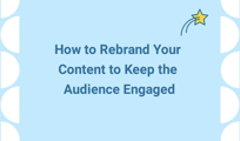The life of a brand consultant is as exciting as it is hectic. To an outsider, you may appear as a creative genius, a magician who can will people to love a brand just by throwing in a couple of catchy slogans and a viral video. But, as is the case with magic, behind a seemingly effortless trick are hundreds of hours of hard work. You conduct research, analyze data, make strategies, create content and visuals, monitor social media… And that’s just the tip of the iceberg.
That’s why it’s vital that you are equipped with the best tools to perform your tasks as effectively and smoothly as possible. And while each specialist will sooner or later compile their own ideal toolkit, for those who are starting or are in search of reliable alternatives, we’ve compiled a list of tools you cannot go wrong with. Let’s dive in.
What Is a Branding Tool?
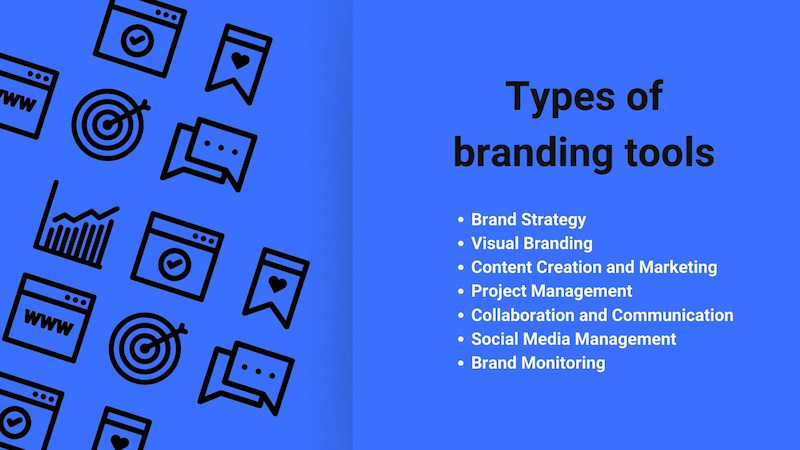
Unlike other categories, such as, for example, ‘email marketing tools’ that include services and apps quite similar in terms of the results they deliver, a ‘branding tool’ is a very general term that incorporates everything from content creation to website analytics. Branding is more than just a specific color palette and a recognizable logo—it’s reflected in every piece of content, company action, and customer interaction. To ensure your branding is effective and consistent, you need a diverse set of tools:
- Brand Strategy
- Visual Branding
- Content Creation and Marketing
- Project Management
- Collaboration and Communication
- Social Media Management
- Brand Monitoring
Brand Strategy
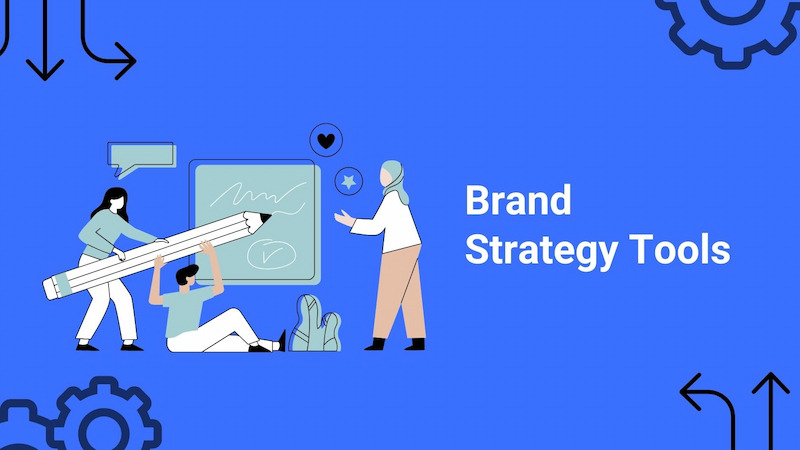
A brand strategy is a framework that outlines how the company plans to establish, shape, and manage its brand identity and raise brand awareness. While it includes visuals and messaging, building a successful brand starts with market research. Who are the potential buyers? Will your unique proposition resonate with them? How will you differentiate yourself from your competitors? Here are some services that will help you make data-driven decisions.
- Google Trends: Google Trends allows you to explore search trends over time, helping to identify the relevance of specific keywords and topics. This can be useful for understanding if your messaging aligns with the solutions people are looking for.
- Statista: This is a subscription-based market research service that can provide you with market analysis, consumer insights, and industry trends that are necessary for a well-informed brand strategy.
- Ahrefs: This social media analytics service allows you to analyze keywords as well as monitor your competitors’ online presence. By knowing where your competitors stand, you can better grasp your brand’s opportunities and how to differentiate your brand from other players in the market.
- SEMrush: A solid Ahrefs alternative that reportedly has a larger backlink database and better backlink reports and tools. So if you rely on building backlinks in your branding strategy, SEMrush is worthy of consideration.
- Qualtrics: With this service, you can create surveys and conduct interviews with focus groups to uncover how people perceive your brand and whether your messaging reaches them in the way you want it to.
- Government and Census Data: Open government resources are a great place to find information on demographics and economics which are important factors for market analysis.
- Online Communities and Forums: Places like Reddit and Quora can provide you with invaluable insights into your audiences’ pain points and opinions.
Visual Branding
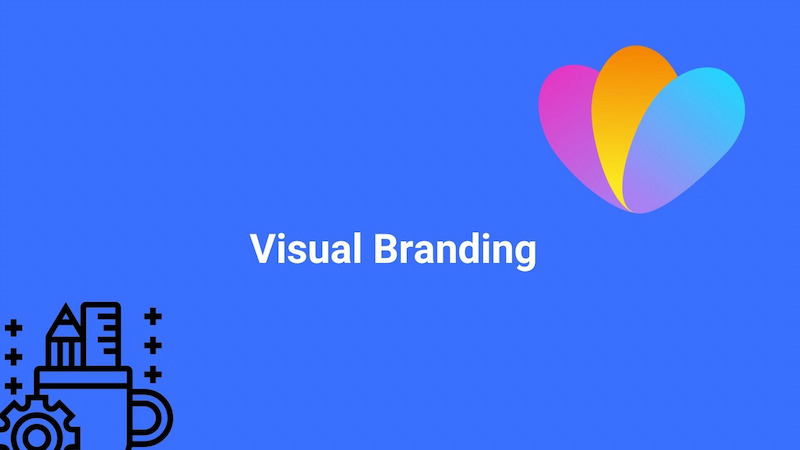
Giving your new brand a distinctive look is one of the most exciting and important parts of the brand journey. After all, over 50% of first impressions of a brand are visual.
While the main work will probably be done by professional designers, you’re going to go through a few crucial rounds of sharing concepts and ideas—so here are the best tools to streamline your communication.
- Looka: An AI-powered logo creation tool that helps you design and visualize your brand logo on different products and marketing materials. It’s very easy to use, doesn’t require professional design knowledge, and is a great source of ideas and inspiration.
- Adobe Color: A handy tool that allows you to create and save color schemes. It offers multiple color harmonies, making the process of figuring out a color palette fast and effortless.
- Envato: If you want to level up your brand’s visuals without spending hours designing from scratch, Envato has you covered. With a huge library of logos, fonts, design templates and much more, this platform is your go-to source for creative digital assets. Created by professional creatives following the latest design trends, you’ll find plenty of ready-made assets to help you create a polished, professional look without the hassle.
- Canva: Easy-to-use design tool perfect for creating all kinds of visuals like documents, marketing materials, and social media graphics. It’s intuitive and boasts a large library of ready customizable templates speeding up the content creation process significantly.
- Adobe Express: A very simple design service with a drag-and-drop editor and an impressive template library. If you or your designers already work with Adobe Photoshop and InDesign, Express is the perfect way to publish their work online.
Piktochart: Another great design option for creating infographics, posters, presentations, and videos. It doesn’t require training and offers an AI assistant and templates for different industries and purposes. - FlippingBook: A digital publishing platform that allows you to brand documents. It converts PDFs into interactive digital flipbooks that can be branded with a clickable logo, distinctive color palette, and favicon. Flipbook links can be branded, too, which makes them instantly recognizable and trustworthy.
Brand Messaging
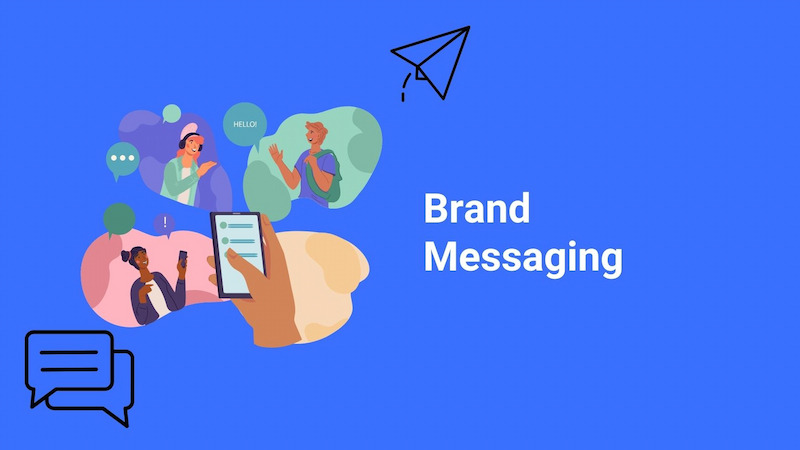
Brand messaging communicates the brand's story, values, and benefits effectively to the target audience. While creating it is important, it is equally important to ensure it’s clear and consistent throughout all the communication channels, as consistent branding can increase revenue by up to 10–20%.
- Grammarly: A writing tool that helps you check the tone of voice of the content pieces you create, ensuring it’s distinct and consistent across all your marketing campaigns.
- Headline Analyzer by CoSchedule: As the name suggests, this tool can be used to analyze and optimize your headlines for maximum impact.
- Voice and Tone Guides: You (or your clients) might think that a small brand that’s just starting out doesn’t need a full-blown voice and tone guide. However, as it grows and more content creators join the team, they will need something to rely on when working on the marketing materials. A guide is the best way to ensure your messaging remains consistent.
Here’s a good example of a comprehensive branding guide:
Content Creation and Marketing

These tools are essential for every brand consultant, helping to create and sustain a brand's visual identity and distinctive tone of voice, as well as promoting the brand through various marketing campaigns.
- Mailchimp: Mailchimp may have started as an email marketing platform, but they’ve long since outgrown that definition. It is now a comprehensive marketing platform that enables you to manage email campaigns, build landing pages, and create social media content.
- Brevo: This CRM handles not just marketing tasks but also sales and customer support. Despite its impressive feature suite, it scales nicely, making it user-friendly and affordable even for growing businesses.
- BuzzSumo: Beyond its monitoring and trends research capabilities, BuzzSumo's true strength lies in its database of over 700 journalists and influencers. This makes it an invaluable tool for spreading the word about your brand and increasing brand awareness.
Project Management

The key to successful branding lies in the careful implementation of the strategy you’ve developed. That means setting tasks for the team and overseeing them. Depending on the scope of your project, you may need one of several tools to help you manage editorial processes, and here are a few most reliable options:
- Trello: Trello is an easy-to-set-up project management platform where you can create boards for specific tasks. It gives you a clear picture of your team’s work progress and what still needs to be done. You can use Trello for a variety of tasks, such as project tracking, content planning, sharing brand guidelines, and conducting market research.
- Monday.com: More sophisticated than Trello, Monday.com might require more time to fine-tune to your needs. Yet, it's powerful, user-friendly, and highly customizable, which can be crucial for streamlining work processes.
- Notion: Notion is an excellent choice for brand consultants as it allows you to create databases and wikis. This helps in organizing information and tasks, ensuring everyone stays aligned with the brand guidelines.
- Wrike: Wrike is a good choice when you need to manage multiple brands at once. At its core, it offers the same features as the other tools on the list, like Kanban boards for task management. However, its interactive Gantt charts and convenient dashboards make it much easier to visualize your brand strategy or strategies.
- Buddy Punch: Buddy Punch is flexible, intuitive, and simple time clock software designed to streamline more in your organization than simply tracking time. This software manages your administrative tasks by simplifying and reducing manual errors, so your team can focus on activities that directly build the brand.
Collaboration and Communication

Collaboration is essential in ensuring your internal team is aligned, but it's also important to have effective tools for client-facing communication. Building a brand is impossible without partnering with others and gaining trustworthy allies along the way. Here are some tools that cater to both internal and client-facing communication needs:
- Slack: Slack excels in internal communication, but its professional communities are a great source of the latest trends, valuable knowledge, and networking opportunities. There are tons of useful channels for marketers you can join—don’t miss out.
- GoToWebinar: A tried and true platform for hosting and co-hosting webinars that probably doesn’t require an introduction. You can host branded webinars, collect leads, and engage the audience through live chat, polls, and Q&As. However, as a brand consultant, you’ll also find it useful for conducting client presentations and strategy sessions. It allows you to share screens, slides, and documents in real time, making it easy to present concepts and brand strategies.
- Miro: Excellent for brainstorming, visualizing ideas and concepts, and conducting online workshops, Miro is an invaluable collaboration tool. If your involvement is mainly in the initial stages of projects, Miro might be the best tool for collaboratively creating the brand.
- Figma: Figma is as much a design as it’s a collaboration tool, yet we place it here because of its unparalleled teamwork features that make reviewing projects and commenting on them a breeze. When working on a website or brand assets together, Figma is one of the best options for comfortable teamwork.
Social Media Management
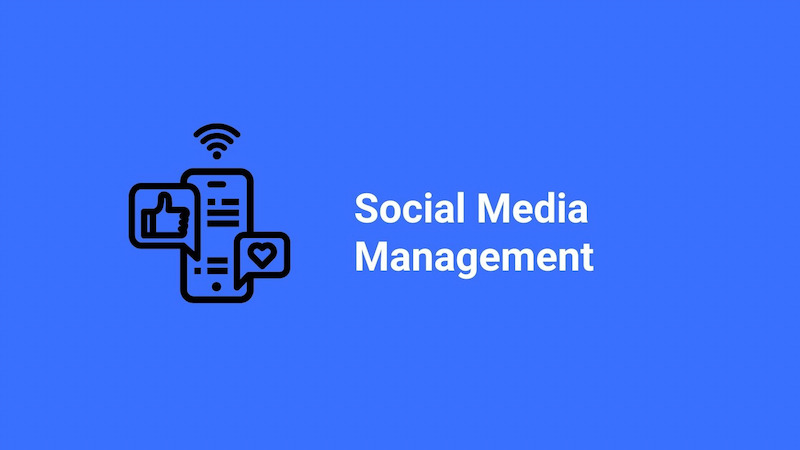
Arguably, social media management takes most of your resources daily as it’s just a lot of work that should be done frequently and consistently to be effective. Yet, social media presence is everything when it comes to building brand awareness—so there’s no escaping it. Luckily, with the right tools you can easily autopilot most of the tasks and free up resources for more creative endeavors.
- Hootsuite: One of the most popular social media platforms, Hootsuite assists in scheduling posts, analyzing performance, and even drafting content pieces with its AI assistant. It’s a solid choice for managing multiple social media accounts and ensuring you stay on top of things.
- Social Sprout: Another social media management platform and Hootsuite’s direct competitor. Although more expensive initially, it has been praised for its outstanding customer support services. Therefore, for mid-sized to enterprise-level companies, it might be a more suitable option.
- Statusbrew: A compelling alternative to Sprout Social, providing robust social media management solutions at a more affordable price. Its standout feature is automation, which streamlines repetitive tasks such as content approvals, spam comment moderation, and critical action alerts.
- CoSchedule: We’ve already mentioned CoSchedule’s Headline Analyzer but the software itself is also powerful and quite handy. It combines social and content calendars, analytics features, and even offers on-demand marketing courses—a nice bonus for busy specialists looking to grow in their field.
- SocialPilot: A tool that streamlines social media management with post scheduling, AI-powered content creation, and advanced analytics. It supports team collaboration, white-label reporting, and multi-platform publishing. Ideal for agencies and businesses, it helps save time, improve performance, and scale brand presence — all in an affordable, easy-to-use platform.
Brand Monitoring
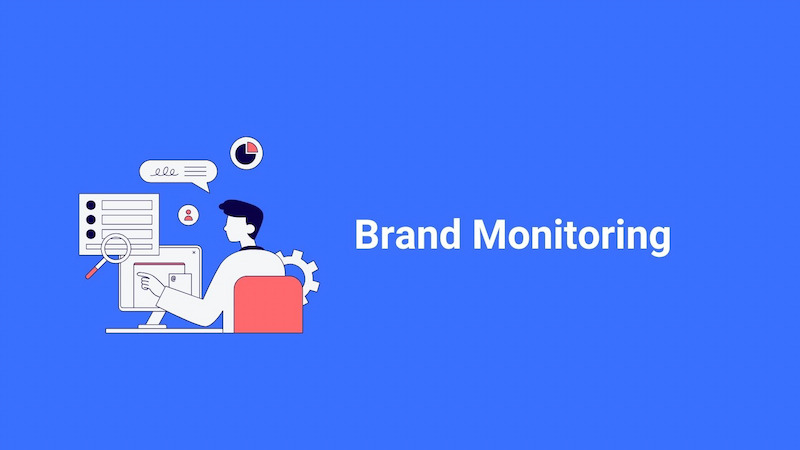
Keeping your finger on the pulse of your brand is vital for its growth and reputation. It helps you understand what resonates with your audience and what doesn’t, providing valuable insights into their preferences. Plus, it enables you to respond quickly and effectively to the needs and concerns of your clients, which will undoubtedly earn you trust points.
- Google Alerts: It’s a free tool that allows you to set up email notifications for specific keywords and brand mentions across the web. While it's simple, it can be effective for basic brand monitoring when you are just starting out.
- Brandwatch: Brandwatch straddles categories as it serves as both a content calendar and a brand tracking tool, and it does both exceptionally well. So if you’re looking for a one-stop-shop for your content and social media activities, Brandwatch may be a good choice.
- Mention: The main focus of this tool is on listening to trends and monitoring brand mentions, and it’s extremely precise. Gain data-driven insights from your audience, research competitors, and grow your brand. If you need additional social media publishing features, Mention offers those too.
As a brand consultant, staying on top of the latest marketing and sales trends is crucial, and updating your toolkit might not always be your first priority. However, investing effort in organizing it and discovering new, more effective ways to work always pays off in less stress and increased revenue. We hope this list has inspired you to try some new branding tools, and that they will aid in both your professional and financial growth.



